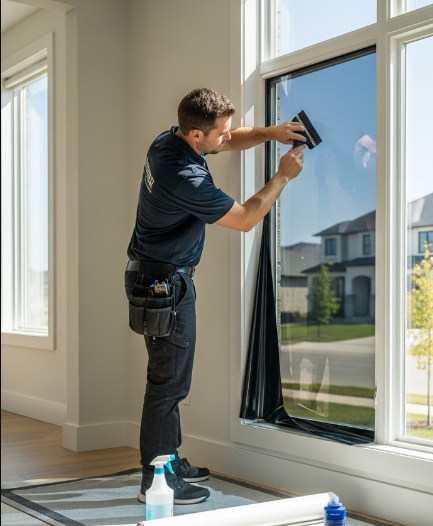Residential Window Tinting: The Smart Choice for Energy Efficiency and Comfort
Residential Window Tinting M&G Mobile Window Tinting / November 6, 2025

Understanding Residential Window Tinting
Window tinting involves applying a thin film to the glass surfaces of residential properties. This film can come in various shades and specifications, allowing homeowners to choose the level of privacy and light penetration that suits their needs. The primary function of window tinting is to reduce the amount of solar heat entering a home, thereby regulating indoor temperatures effectively.
Types of Window Tinting Films
There are several types of window tinting films available on the market. The most common include:
- Dyed Window Films: These films absorb solar energy, reducing glare and heat without altering the appearance of windows significantly.
- Metalized Window Films: Incorporating tiny metallic particles, these films reflect heat and UV rays, enhancing energy efficiency while providing a shiny finish that adds sophistication.
- Ceramic Window Films: Known for their durability and heat rejection capabilities, ceramic films do not interfere with wireless signals, making them an excellent choice for tech-savvy households.
Enhancing Energy Efficiency
One of the most compelling reasons to consider window tinting is its positive impact on energy efficiency. Homes can experience significant temperature fluctuations throughout the year, leading to increased reliance on heating and cooling systems. By reducing the amount of heat entering a home during hot summer months, window films help maintain a comfortable indoor climate.
Cost Savings on Energy Bills
Investing in window tinting can lead to substantial savings on energy bills. According to studies, residential window films can reduce cooling costs by up to 30% or more. This reduction is primarily due to the decreased demand on air conditioning units, which can also extend their lifespan. Homeowners often find that the initial investment in professional tint installation pays for itself over time through lower energy expenses.
UV Protection
Another notable benefit of window tinting is its ability to block harmful ultraviolet (UV) rays. Prolonged exposure to UV radiation can lead to skin damage and fading of furniture, carpets, and artwork. Most quality window films can block up to 99% of harmful UV rays, thereby safeguarding both the health of occupants and the integrity of interior furnishings.
Improving Comfort and Aesthetics
Beyond energy efficiency, window tinting enhances overall comfort within a home. By reducing glare from the sun, residents can enjoy a more pleasant environment, making it easier to watch television, work on computers, or simply relax without being disturbed by harsh sunlight.
Aesthetic Appeal
Window films come in various designs and shades, allowing homeowners to customise the look of their property. Whether opting for a sleek, modern appearance or a more traditional aesthetic, the right tint can enhance curb appeal and increase property value. Professional installation ensures that the film is applied correctly, providing a flawless finish that complements the architectural style of the house.
The Importance of Professional Installation
While some may consider attempting DIY window tinting, the intricacies involved in achieving a perfect result warrant the expertise of a professional. Experienced technicians possess the skills to select the appropriate film for specific needs, ensuring compliance with local regulations and guidelines. Moreover, professional installation guarantees that the film is applied flawlessly, preventing issues such as bubbling or peeling that can arise from improper techniques.
